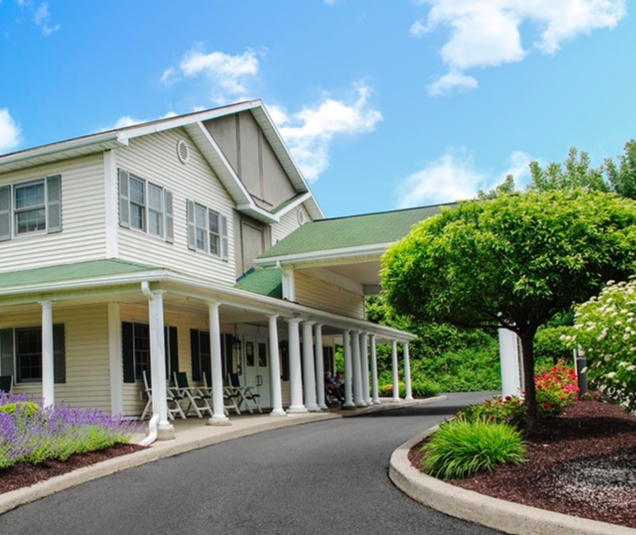Helping a loved one affected by dementia can be challenging, and seeking care for their needs is often a deeply personal process. It’s normal for there to be emotional and practical hurdles.
Each person’s journey on this path is unique, as is the experience of their family, so there’s no universal guide on how to move a parent with dementia into a care community. But there are some things to consider, such as planning ahead, staying organized throughout the move, and helping your loved one adjust to their new home.
Choosing the right community is also particularly important because assisted living communities aren’t usually designed to help people with dementia, particularly at later stages. If your parent has dementia, you may need to seek out a memory care community instead. Some communities, like Peregrine Senior Living at Shaker, offer assisted living and memory care services. Communities like ours that offer multiple services can often provide a smooth transition as your parent’s needs evolve over time.
Understand Why a Move May Be Necessary
The decision to move a parent with dementia into a memory care community can stir a complex mix of emotions. It’s important to acknowledge these feelings are part of the process for many families.
When a person has dementia, their needs can often surpass the support family members can provide at home. Memory care offers a specialized environment designed to address the challenges associated with dementia, such as memory loss, confusion, and behavioral changes.
These communities provide around-the-clock care from trained professionals who understand the progression of dementia, ensuring residents receive tailored support in a structured and calming setting.
Planning for the Move Before It’s Needed
Laying out a well-thought-out plan can reduce the stress of this transition. Consider timing, your parent’s specific needs, and available resources. Early planning allows you ample time to conduct thorough research, visit potential communities, and prepare everyone involved in the decision.
It’s vital to remember that you don’t have to face these decisions alone. Seeking guidance from healthcare professionals, social workers, and support groups can offer invaluable insights and emotional backing.
Choosing the Right Community
Selecting the right senior living environment is a pivotal part of the process. Part of this selection is determining whether your parent needs assisted living or memory care.
Safety remains a top priority for any community you consider for a parent with dementia. Look for environments offering secure settings, immediate emergency responses, and skilled staff adept at managing dementia-related behaviors.
Not every assisted living community provides memory care, so it’s crucial to ensure that the community you select offers programs tailored to cognitive function support and dementia care. This ensures a suitable and sustainable living situation even as dementia progresses.
In some cases, respite care can be a good option too. On one hand, it provides a short break for family caregivers. But it also gives your loved one a chance to “test run” the community to see if it’s a good fit that meets their needs and preferences.

Preparing for the Transition
Preparing your parent for the move requires thoughtful consideration. Beginning conversations early and involving your loved one in planning can help mitigate unease. Familiarize them with the new surroundings through community visits, photographs, and detailed informational resources.
Clear communication with family members is equally critical. When everyone is aligned and knows their roles, it can streamline the process.
Organizing the Move
There are several practical ways that you can help organize the move:
- Declutter and pack vital possessions to make moving day less hectic.
- Incorporate cherished personal items to help recreate a sense of home in the new environment.
- Select a moving date that avoids unnecessary stress. For example, steer clear of major holidays or family events.
- Early preparation for logistics can alleviate pressure. If possible, enlist professional movers to focus entirely on your loved one during the transition.
- Ensure all medical records and necessary medications are transferred smoothly.
Support the Transition
Each person’s adjustment period to a new living situation will differ. Approach this time with patience and empathy, and guide your parent through the changes.
Adjustments don’t happen overnight. Provide emotional backing, visit regularly, and encourage them to participate in community activities. Support them in establishing new friendships and engaging socially.
Helping your parent establish a routine can also promote comfort and stability, aiding in their transition to this new phase of life.
After the Move
Remain actively engaged and communicate with community staff. This will help you stay updated on visitation protocols and changes in your parent’s care plan. Regular family meetings can also be invaluable.
Find Support Where You Need It
At Peregrine Senior Living at Shaker, we’re committed to supporting you and your family through every step of this transition. From understanding the decision to choosing the right community and maintaining ongoing support, we’re here to help.
We’re ready to answer your questions and provide a tour to showcase the supportive environment available here. So, reach out and chat with our compassionate team today.












Dining at our community is about more than what’s on the plate—it’s about connection, community, and the joy of gathering together.
Our talented culinary team crafts meals that are both delicious and nutritious, offering flavors that comfort and inspire.
From themed dinners to chef demonstrations, each meal becomes an opportunity to savor the moment and celebrate life’s simple pleasures. 🍴
peregrineshaker.com/ ... See MoreSee Less
At Peregrine Shaker we are always up for trying something new. This week we started a wine tasting series. We started off with Chardonnay! We learned about how this wine is made and about the grapes that give it the distinct taste. Everyone enjoyed the tasting experience. Which wine should we try next? ... See MoreSee Less
We welcome surprise visits. Our friend Maple Syrup dropped by for a visit today. ... See MoreSee Less
Today we celebrate the caregivers—those whose quiet strength and unwavering compassion bring comfort to so many.
We see the difference caregivers make every day: holding a hand, sharing a smile, or offering reassurance when it’s needed most. 💕
Your dedication reminds us that true care goes beyond tasks—it’s an act of love, patience, and humanity.
Thank you for all you do to make the world a more compassionate place.
peregrineshaker.com/ ... See MoreSee Less
Awesome trip to Dinosaur BBQ today for lunch, great food and a friendly atmosphere. ... See MoreSee Less
It’s truly a treat when our staff can share their culture with us. Our receptionist Annie gave a presentation about Chinese New Year and shared her family’s traditions. May good fortune come to all! ... See MoreSee Less
We had such a fun time at our indoor Olympic Games event. We played snow ball toss/fight 😁, hop scotch toss, golf putt contest and basketball shootout, followed by a cookies and cream ice cream social. ... See MoreSee Less